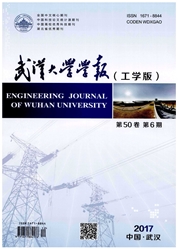

 中文摘要:
中文摘要:
为了揭示农业面源污染的机理及其成因,选取我国南方典型灌区——湖北省漳河灌区,在野外试验结果分析的基础上,开展了农田排水氮素流失的影响因子及其规律研究.试验结果表明:降雨是影响农田排水中N流失量的最主要因素;作物叶面积指数等生理生态指标对N的流失起着非常关键的作用;节水灌溉对农田排水径流量和渗漏量有明显抑制作用;不同土地利用类型改变了植被和土壤水肥状况,影响N的流失;地形地貌会对降雨侵蚀量、降雨径流特征入渗和养分流失产生一定影响.
 英文摘要:
英文摘要:
On the basis of analysis of field experiments, the laws of nitrogen losses from agricultural fields are studied. In order to reveal the mechanisms and causes of agricultural non-point source pollution, the Zhanghe Irrigation District in Hubei Province, which is a typical irrigation district in south China, is selected to conduct experiment on the influencing factors and laws of nitrogen losses in the agricultural drainage water. The experimental results show that: rainfall is the most important factor influencing the losses of N from farmland; crop growing indexes such as leaf area index have a strong relationship with the losses of N; water-saving irrigation can decrease the runoff and percolation loadings in the drainage water; different land-use types change the losses of N; topography and landscape have impacts on soil erosion, rainfallrunoff characteristics and infiltration processes.
 同期刊论文项目
同期刊论文项目
 同项目期刊论文
同项目期刊论文
 期刊信息
期刊信息
